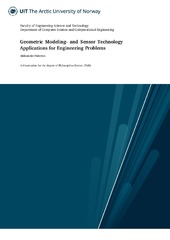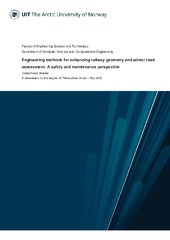| dc.contributor.advisor | Fredriksen, Hege-Beate | |
| dc.contributor.advisor | Rypdal, Martin | |
| dc.contributor.author | Haug, Sofie Flyvholm | |
| dc.date.accessioned | 2019-07-15T11:11:29Z | |
| dc.date.available | 2019-07-15T11:11:29Z | |
| dc.date.issued | 2019-05-31 | |
| dc.description.abstract | Equilibrium climate sensitivity (ECS) measures the long-term global surface temperature response due to a doubling of CO2 in the atmosphere. Estimates of ECS is not well constrained, 1.5-4.5C [Pachauri et al., 2014], and there is a wide spread between different Earth system models (ESMs). Recently it has
been suggested that ECS can be constrained using an observed relationship between the statistical properties of the unforced temperature fluctuations extracted from historical runs of energy system models (ESMs), and the Gregory estimates of ECS in these models [Cox et al., 2018]. In this thesis I derive general fluctuation-response relations for linear stochastic climate models and investigate the claimed relation over an ensemble of ESMs. My findings are consistent with the existence of a fluctuation-response relation, but uncertainties
are large, and I find it unlikely that they can be used to constrain ECS. My conclusion is that the time period 1850-present is too short for estimation of ECS, and that we ultimately have to rely on longer reconstructed temperature time series or satellite measurements of Earth’s energy imbalance. | en_US |
| dc.identifier.uri | https://hdl.handle.net/10037/15760 | |
| dc.language.iso | eng | en_US |
| dc.publisher | UiT The Arctic University of Norway | en_US |
| dc.publisher | UiT Norges arktiske universitet | en_US |
| dc.rights.accessRights | openAccess | en_US |
| dc.rights.holder | Copyright 2019 The Author(s) | |
| dc.rights.uri | https://creativecommons.org/licenses/by-nc-sa/4.0 | en_US |
| dc.rights | Attribution-NonCommercial-ShareAlike 4.0 International (CC BY-NC-SA 4.0) | en_US |
| dc.subject.courseID | EOM-3901 | |
| dc.subject | VDP::Matematikk og Naturvitenskap: 400::Matematikk: 410::Anvendt matematikk: 413 | en_US |
| dc.subject | VDP::Mathematics and natural science: 400::Mathematics: 410::Applied mathematics: 413 | en_US |
| dc.subject | VDP::Matematikk og Naturvitenskap: 400::Geofag: 450::Andre geofag: 469 | en_US |
| dc.subject | VDP::Mathematics and natural science: 400::Geosciences: 450::Other geosciences: 469 | en_US |
| dc.subject | VDP::Matematikk og Naturvitenskap: 400::Matematikk: 410::Statistikk: 412 | en_US |
| dc.subject | VDP::Mathematics and natural science: 400::Mathematics: 410::Statistics: 412 | en_US |
| dc.subject | VDP::Matematikk og Naturvitenskap: 400::Informasjons- og kommunikasjonsvitenskap: 420::Matematisk modellering og numeriske metoder: 427 | en_US |
| dc.subject | VDP::Mathematics and natural science: 400::Information and communication science: 420::Mathematical modeling and numerical methods: 427 | en_US |
| dc.title | On the relationship between global mean temperature in historical runs of Earth system models and equilibrium climate sensitivity | en_US |
| dc.type | Master thesis | en_US |
| dc.type | Mastergradsoppgave | en_US |


 English
English norsk
norsk



